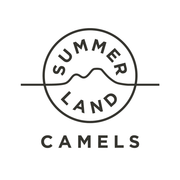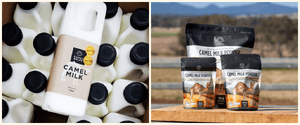Why Camel Milk? The Ancient Superfood
Today is World Milk Day and we think this is a fantastic opportunity to celebrate Camel Milk!
Occasionally we have comments on our social media posts and Facebook ads questioning why on earth anyone would want Camel Milk. Sometimes accompanied by a question like, “What’s next? Pidgeon milk?”
Sadly, these type of comments demonstrate ignorance about our world and about history. While Camel Milk might be a relatively novel concept in Australia, it is consumed by people in large parts of the world.

A nomadic herder preparing to milk his camel. Source: georgeoprea9 / Adobe Stock
The Camel is thought to be the first animal to have been domesticated. Camels have been used for transport and food for thousands of years. Nomadic people and herders have been known to live on Camel Milk for weeks at a time and it has also sustained whole villages through periods of drought.
In Australia, we are in a unique position. The Camel Milk industry has amazing potential but also significant challenges. Australian Dromedaries are disease-free and have the best genetics in the world. Our population of wild camels thrive in Australia’s harsh desert environment and while they are considered a pest to humans their presence is not detrimental to the environment.

Some of the challenges facing us in Australia include awareness, education and overcoming cultural barriers and this is why Summer Land Camels is also a tourism operation with Farm Tours, Camel Rides and a Café and Farm Shop. In addition to this, there are many costs involved with Camel Milk that the bovine dairy industry doesn’t have.
These include purchasing wild camels, transporting them from the Outback, domesticating them, training them to be milked in the dairy and the list goes on. Camels can only be milked when they have their babies nearby so there is the added cost of handling two animals in order to milk one. Camels also produce much less milk than cows – around 3L per day on average as opposed to cows producing 20-60L.

Photo Credit - Zak Simmonds for the WeeklyTimes
So why would anyone want to drink Camel Milk?
Firstly, it truly is one of nature’s superfoods. It is rich in healthy vitamins and minerals, and contains disease-fighting immunoglobulins - boosting the effectiveness of the immune system and providing potent healing benefits for the gut.
India’s National Research Centre on Camels , says that camel milk is lower in cholesterol and sugar, and enriched with protective proteins. With its immune factors and growth promoters, camel’s milk is the closest milk substitute to human breast milk. This is why camel milk could fulfil the nutritional requirements of nomadic people for extended periods without food.
Secondly, it doesn’t contain the protein β-lactoglobulin that irritates lactose intolerant people. It is the presence of this protein that causes most people to be unable to break down this complex sugar, lactose, that is present in almost all other animal milk .
We have many customers who tell us that despite being lactose intolerant or sensitive to dairy, they can safely and comfortably consume Camel Milk. You can read some of their stories here, here and here.
Thirdly, it tastes great! Our Camel Milk and Camel Milk Powder have won multiple Gold Medals at the Sydney Royal Show and the Royal Queensland Show as well as many other awards.
The taste can be described as having a crisp, clean flavour with a slightly salty taste. It is definitely not the “gamey” flavour that many people expect before they try it for the first time!

While the cost of Camel Milk means that you are probably not going to be having it with Coco Pops every morning, we do have customers who come to the farm to bulk buy a dozen litres at a time or who purchase our Camel Milk online so they can enjoy their coffee with “real milk” rather than plant-based alternatives.
There is also a great demand for Camel Milk for medicinal purposes. Camel Milk has been used to assist in the management of diabetes, autism spectrum disorders, gastric ulcers, immune disorders, fatty liver disease, hepatitis, cancer, Crohn’s disease and other gut disorders, autoimmune diseases and the list goes on. While there have been many research studies done on the benefits of Camel Milk to assist with disease management, particularly diabetes, there is still a need for more and we encourage people to research the scientific literature and consult with their doctor in regards to their individual needs.
However, for general health and wellness, there is little question about the benefits of this amazing superfood - Camel Milk. Nutrient dense, high in vitamins, minerals and Essential Fatty Acids 3, 6, 9. High in disease fighting immune proteins - anti-inflammatory and anti-viral - to support the immune system and gut health.
Why not try some today?
Where Can I Buy Camel Milk and Camel Milk Products?
Fresh Milk - Our award-winning Camel Milk is a great dairy alternative, and contains no beta-casein A1. It is rich in vitamins, minerals, healing immune proteins and its silky, smooth and clean texture makes it the best tasting milk for every occasion. You can buy fresh Camel Milk from our farm near Harrisville Qld or from a range of stockists in Southeast Queensland. For bulk orders, please place an order with us prior to your visit. Home delivery is also available to selected postcodes in Brisbane, Gold Coast and Sunshine Coast.

Powdered Milk –
Our fresh Camel Milk is freeze dried to lock in the pure goodness. Add some Camel Power to your day! A perfect addition to milkshakes, smoothies, or for adding to cooking. Available in 100g and 200g sealed packs.
- Pure Australian Camel Milk
- 100% Natural
- No additives or preservatives
- Rich source of vitamins and minerals
- Halal Certified
Available from our farm or shop online.

Summer Land Camels is Australia’s Largest Camel Dairy and is located near Harrisville in the beautiful Scenic Rim, only 45 minutes from Brisbane and just over an hour from the Gold Coast and Toowoomba.
https://pubmed.ncbi.nlm.nih.gov/34025186/
https://www.ancient-origins.net/news-history-archaeology/camel-milk-0016829



